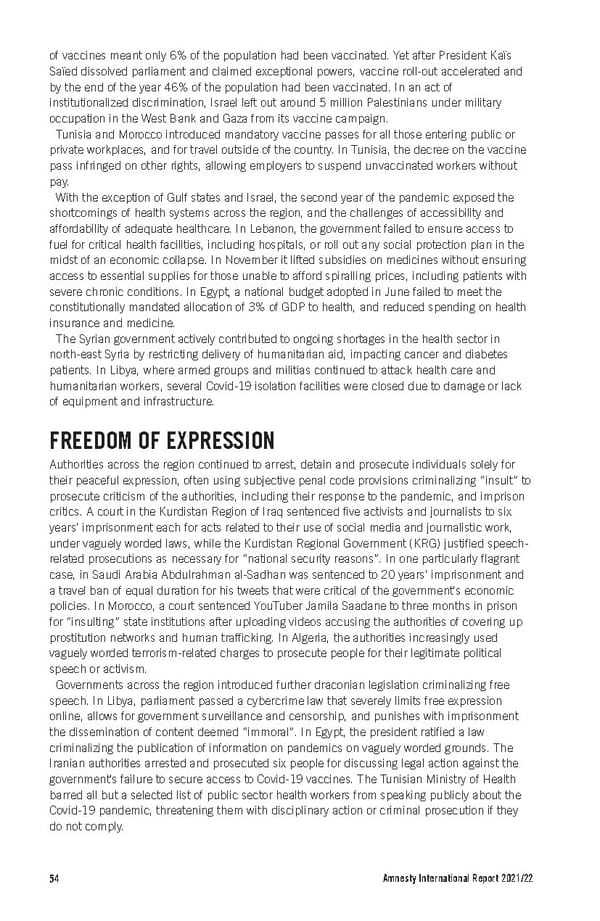of vaccines meant only 6% of the population had been vaccinated. Yet after President Kaïs Saïed dissolved parliament and claimed exceptional powers, vaccine roll-out accelerated and by the end of the year 46% of the population had been vaccinated. In an act of institutionalized discrimination, Israel left out around 5 million Palestinians under military occupation in the West Bank and Gaza from its vaccine campaign. Tunisia and Morocco introduced mandatory vaccine passes for all those entering public or private workplaces, and for travel outside of the country. In Tunisia, the decree on the vaccine pass infringed on other rights, allowing employers to suspend unvaccinated workers without pay. With the exception of Gulf states and Israel, the second year of the pandemic exposed the shortcomings of health systems across the region, and the challenges of accessibility and affordability of adequate healthcare. In Lebanon, the government failed to ensure access to fuel for critical health facilities, including hospitals, or roll out any social protection plan in the midst of an economic collapse. In November it lifted subsidies on medicines without ensuring access to essential supplies for those unable to afford spiralling prices, including patients with severe chronic conditions. In Egypt, a national budget adopted in June failed to meet the constitutionally mandated allocation of 3% of GDP to health, and reduced spending on health insurance and medicine. The Syrian government actively contributed to ongoing shortages in the health sector in north-east Syria by restricting delivery of humanitarian aid, impacting cancer and diabetes patients. In Libya, where armed groups and militias continued to attack health care and humanitarian workers, several Covid-19 isolation facilities were closed due to damage or lack of equipment and infrastructure. FREEDOM OF EXPRESSION Authorities across the region continued to arrest, detain and prosecute individuals solely for their peaceful expression, often using subjective penal code provisions criminalizing “insult” to prosecute criticism of the authorities, including their response to the pandemic, and imprison critics. A court in the Kurdistan Region of Iraq sentenced five activists and journalists to six years’ imprisonment each for acts related to their use of social media and journalistic work, under vaguely worded laws, while the Kurdistan Regional Government (KRG) justified speech- related prosecutions as necessary for “national security reasons”. In one particularly flagrant case, in Saudi Arabia Abdulrahman al-Sadhan was sentenced to 20 years’ imprisonment and a travel ban of equal duration for his tweets that were critical of the government's economic policies. In Morocco, a court sentenced YouTuber Jamila Saadane to three months in prison for “insulting” state institutions after uploading videos accusing the authorities of covering up prostitution networks and human trafficking. In Algeria, the authorities increasingly used vaguely worded terrorism-related charges to prosecute people for their legitimate political speech or activism. Governments across the region introduced further draconian legislation criminalizing free speech. In Libya, parliament passed a cybercrime law that severely limits free expression online, allows for government surveillance and censorship, and punishes with imprisonment the dissemination of content deemed “immoral”. In Egypt, the president ratified a law criminalizing the publication of information on pandemics on vaguely worded grounds. The Iranian authorities arrested and prosecuted six people for discussing legal action against the government’s failure to secure access to Covid-19 vaccines. The Tunisian Ministry of Health barred all but a selected list of public sector health workers from speaking publicly about the Covid-19 pandemic, threatening them with disciplinary action or criminal prosecution if they do not comply. Amnesty International Report 2021/22 54
 Amnesty International Report 2021/22 Page 53 Page 55
Amnesty International Report 2021/22 Page 53 Page 55